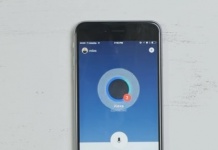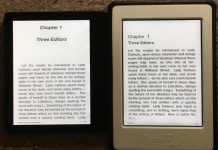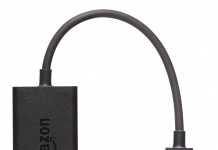Here’s another technology that might one day make a big difference to the ebook/ereader/tablet reading experience. As Mashable announced in a recent article, the eye tracking solutions developed by assistive technology manufacturer Tobii “lets you control a tablet with your eyes.” And I can’t imagine any more obvious, natural, elegant implementation of this technology than the natural left-to-right (or right-to-left for Arabic and Hebrew readers, naturally) scanning motion of the human eye across a page.

That said, this technology is not exactly ready for mass-market prime time. The Tobii EyeMobile solution uses the Tobii PCEye “peripheral eye tracker,” a sensor bar that attaches to the tablet or device and “replaces the standard mouse.” Right now, this is offered to work with Windows 8 PCs, and the newer generation of Windows 8 tablets, targeting chiefly users with impaired motor skills. This is not exactly a cheap solution, with the entire package costing upwards of $4000. However, it’s there now and available for any users who could benefit from it.
Tobii may be grabbing the attention with actual off-the-shelf solutions, but others are not far behind the curve. Last year, Google patented an eye-tracking unlock system which was probably intended for use with Google Glass, and has already had facial recognition unlocking implemented as standard since Ice Cream Sandwich. But if you consider the advances in facial recognition and motion tracking technology in even the most basic digital cameras, and the number of tablets and smartphones on the market with user-facing cameras, then … well, do I need to draw you a diagram?
I suspect that there’s no reason why we couldn’t already be driving our tablets and ereaders with our eyes. After all, we already can do it via voice. In theory, I suppose it might be possible to program Apple’s Siri or Google’s Google Voice to turn the pages of an ebook with a spoken command, and Amazon’s Kindle already has Voice Guide, Text-to-Speech and Easy Reach. So, soon you might never need to press an ebook page with your finger or hit the forward button ever again. Wouldn’t that make for a slightly more comfortable and ergonomic reading experience? As well, perhaps, as for longer-lasting and less smudgy screens.

































